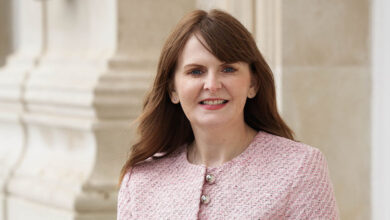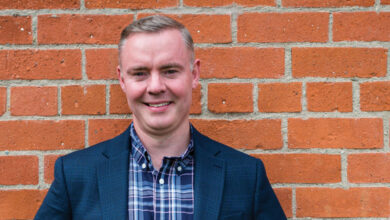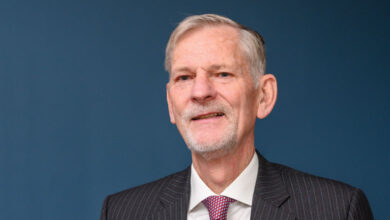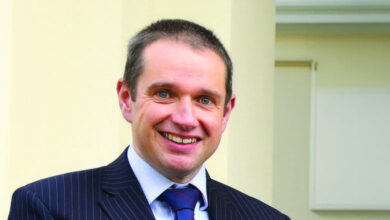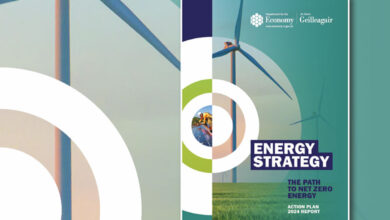Dealing with the leftovers
Recycling and waste management company SITA UK has had a presence in Northern Ireland for 10 years, having acquired the United Waste and Wilson Waste companies, and is seeking to expand as local government waste services go out to tender. Its Chief Executive, Per-Anders Hjort, talks business with agendaNi and explains why the word waste is, for him, a non-starter.
“It’s quite important to get away from the concept of waste. I don’t think we should talk about waste at all,” Per-Anders Hjort remarks, before adding: “I think it is important that we look at waste and how we deal with the leftovers of society as a resource.”
As CEO of one of the UK’s largest waste management companies, it may seem strange that Hjort is keen to do away with the word that describes his line of business. However, his priority is that as much ‘leftover’ material as possible is put to better uses than ending up on the rubbish dump.
Hjort has headed up SITA UK since 2003 and his role also covers the company’s operations in Sweden and Finland – “all the outskirts of Europe”. Its parent company is the established and newly listed French multi-national Suez Environnement which has a turnover of €12 billion. SITA was formed in Paris as the Société Industrielle des Transports Automobiles in 1919 and started operations in the UK in 1988.
Across European countries, he finds that there are “quite different levels of maturity” in environmental management: “I would probably pick Holland, Belgium and the Scandinavian countries as some of the prime countries in that, being quite far ahead.” Recycling and waste management is a “massive growth market” for the sector and its role in society is set to become more important as the EU sets higher environmental standards.
SITA UK’s approach to business is a holistic one, acting, as he puts it, “from the cradle to the grave in waste management.” The company’s activities range from handling and managing waste on clients’ premises, to collecting it from the kerbside, recycling and recovering materials to make new products and to generate energy.
As what society considers waste can be made productive again, he thinks that the word waste is not the best one to describe discarded materials: “It would actually be a very big benefit to scrap the word waste and look at this in a different light.”
Fifty per cent of SITA’s clients are from the public sector and 50 per cent from the private sector, and it operates in all four countries of the UK, and the Isle of Man, employing around 6,000 people. The company has 40,000 industrial and commercial customers, and also 60 contracts with local authorities so decentralising its operations is an important practice.
“We share a lot of common values and common knowledge within the Suez group but it’s important to understand that the type of business we are in needs to be dealt with in a local manner,” he explains. In SITA Northern Ireland, its combined operations have over 90 employees, working on a full range of recycling and waste collection services, and a turnover of £10 million.
Overall, SITA UK’s annual revenue is around £750 million. Forty per cent of its work is collection and the rest involves the treatment of waste. Landfill has been the traditional method of waste disposal in the UK but with the increase in landfill tax, customers are increasingly turning to recycling. The environment has also become a hot topic for public debate.
The actual infrastructure – e.g. composting facilities, recycling centres and energy-from-waste facilities – for dealing with waste is, though, lagging behind. Hjort adds: “In the UK, there is quite a big lack of modern, up-to-date, facilities that can cope with this. Landfill has for a very, very long time been the way that our society has dealt with waste and we are quite far off from other European countries in having that other infrastructure in place.”
Over the coming five to 10 years, SITA UK will be heavily involved in developing new infrastructure. He is keen to point out that the company does not have a “preferred solution” for managing waste but instead emphasises: “It’s very important for local people to have their say in how to deal with the residues of society”.
With its experience, SITA can inform its clients on which solutions will or won’t work. Hjort has found that this does not mean ‘re-inventing the wheel’ each time as there is plenty of good waste management technology already in existence. From its experience across the continent, SITA understands how to make the most of the material that it handles.
The private finance initiative (PFI) is one option for local authorities as they decide how to provide new infrastructure. SITA’s PFI contracts typically last 25 years and include a “whole package” of waste management from collection to treatment. The company has over 10 years of experience in the waste PFI market but is also working with other models, such as joint ventures with local authorities or operating and maintenance contracts.
“Whatever model you use, it’s quite important for any local authority to prepare for what can happen over 25 years and by bundling all the services into one package, you remove many of those risks [from the local authority] to the private sector to a large extent,” Hjort says.
Staying for the long haul is central to SITA’s work. The company has been around for 89 years and sets its horizon 30 to 40 years down the line.
“It is important for us as a group that we look at things in a very long-term perspective. I don’t think that it’s possible for a company like ours, which represents a very vital local service for councils, to look at investments in a short term horizon,” he comments. “It’s just that type of business. You cannot walk in and walk out. We should be there to stay.”
Hjort continues: “Whenever a market is expanding as fast as waste management is at the moment, you will always find entrants coming in with a much shorter investment horizon in mind. That’s not our approach. We are long-term industrial operators.”
Applying this approach to Northern Ireland, he explains that SITA UK sees the province as an area where it will have a continuing presence and when the company applies for a tender, it believes in being as good as its word: “For me, it is extremely important for us that people can trust in what we say and that we deliver what we promise. It should be ‘we do what we say on the tin’.”
The company analyses tenders in detail and, if it finds that it is not the best company to deliver the service, it will look for opportunities elsewhere. Residual waste management services – i.e. those dealing with waste that cannot be reused or recycled – are to be procured by three groups of local authorities in the province: the arc21 region around greater Belfast, the North West, and the Southern Waste Management Partnership (SWaMP). Looking at the Northern Ireland tenders, he says that each will be a key test for SITA.
Corporate social responsibility is also a high priority for the company: “If we don’t have a strong sense of corporate social responsibility, we don’t have any business.” Its sites are accredited to the ISO 14000 environmental standard and Hjort’s ambition is “to be above any standard that legislation sets”.
He explains: “People sometimes feel that the waste management industry is responsible for producing waste. We don’t. If we don’t take away the residue that society leaves, there’s going to be health issues and worse. Our business model is to protect human health and the environment and to reduce the use of raw materials.”
For these reasons, SITA tries to build a good relationship with the community it serves, including local authorities and residents, some of whom are also likely to be its workers.
“We are totally transparent, we don’t have anything to hide and it is my ambition to have all our production facilities over time linking into something like EMAS [the Eco-Management and Audit Scheme] to be open with our operations.”
On health and safety, the company has cut its rate of industrial accidents by 60 per cent over the last four or five years and is keen to take care of its staff: “People should be able to go to work and know that they are totally safe.”
Part of its work also involves educating people about waste. On a practical level, customers learn that sorting refuse into categories is a good habit: “It’s very hands-on. If you put ‘x’ into that bin and ‘y’ into that bin, you know you have done a very good thing for the environment.”
SITA UK also produces worksheets, posters and an interactive game for schools, and these resources are also available in Northern Ireland.
Asked what he finds most satisfying about the company’s work, Hjort points to its financial performance, professionalism and the trust it enjoys with its customers.
“For me trust is the most important thing. People need to be able to trust in what you say, and to understand that we have high ambitions. We are a financially sound business and hence a reliable long term partner. I am very proud of that. We deliver what we say and people can trust us,” he says.
“I am pleased that we have contributed a lot to the discussion of the environmental agenda as a whole in the UK. We spend a lot of time interacting with government, local authorities and various stakeholder groups.”
He sees resource efficiency as one of the most important topics that the world will have to deal with in future, and good waste management as one area where European countries can gain a leading edge over emerging economies.
With SITA’s experience and continental reach, it has plenty of best practice to share with customers in industry and local government. Personally, he would like to see the UK follow the example of his native Scandinavia and increasingly use heat distribution for energy rather than depend on electricity or gas. Energy efficiency from electricity production ranks around 30 to 35 per cent compared to 80 to 90 per cent efficiency in heat distribution. Hjort adds: “We are currently wasting a lot of energy and money in the way we distribute energy.”
In conclusion, he remarks: “We are pleased to be in Northern Ireland. I think it is a very interesting place to work and operate and we have been pleased with our historical presence in the country. We hope that we can help to develop it further.”
Profile
Per-Anders is a Swede working in the British Isles for a French company: “I don’t think there’s too many around to be honest.” He has worked in recycling and waste management for nearly 20 years and was appointed as SITA UK’s Chief Executive in 2003. Married with two sons, Per-Anders splits his time between the UK and Sweden and enjoys gardening, kayaking and generally

